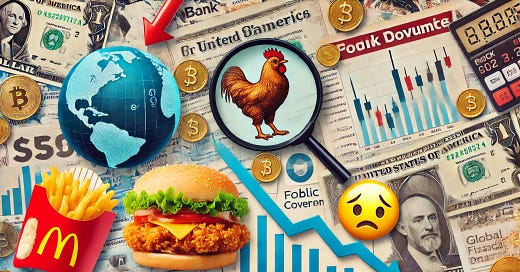Monday links - October 28, 2024
Thoughts on TD Bank, Tether, McDonald's heinous new creation, and bank culture.
Here is what I am reading and thinking about this week.
Monday links
1. Federal Investigators Probe Cryptocurrency Firm Tether, Wall Street Journal, Oct 25, 2024.
The global stablecoin Tether has long been known as a preferred mechanism for money laundering, see here for a deep dive from the WSJ and here for Zeke Faux’s book that includes an entire chapter on the benefits of Tether to facilitate slavery and human trafficking. Tether’s ability to avoid AML prosecutions where firms like Binance have not led me to the desperate conclusion that they have evaded their responsibilities so completely that no such prosecution would come. I even made a bet with a student that there would be no AML indictment against Tether or its executives within the next five years.
That was a week ago. It looks like I might lose that bet. I hope I do! Tether strikes me as one of the most baleful institutions in the global financial system.
2. TD money-laundering scandal puts supervision back under the microscope, American Banker, October 16, 2025
TD Bank is a fascinating and troubling case for so many reasons. One is the basic question: it was subject to continuous supervision, including a dedicated AML examination. The question nearly every time there is a failure of risk management in banking is: where are the supervisors? This question motivates my history of bank supervision with Sean Vanatta (if you haven’t pre-ordered yet, I have questions about the strength of our connection). In this case, the conclusion that many will draw is that supervisors were bad at their jobs. An alternative explanation is that TD Bank went to great lengths to obstruct and obfuscate the supervisory process. One of the key innovations of supervision in the last generation is the advent of the disintermediation of information via the stress test. Is it time for AML examinations to become more robust through non-intermediated AML information to the supervisors themselves?
3. Inflation Has Cooled, but Americans Are Still Seething Over Prices, Wall Street Journal, October 23, 2024
The basic theory of central bank independence is that voters – and thus politicians – will demand greater inflation in the name of greater (nominal) economic growth. We need central bankers bound by law and custom to school us on the errors of these human impulses, to “take the punch bowl away when the party is getting started.”
I have written an entire book on how flimsy this model of independence is. I did not anticipate, however, how much voters would howl in anger over inflation, thus subverting the basic model even more. The 2024 election is not a referendum on the state of the economy, but seems to be a referendum on the fact of the inflationary burst of 2022-23, in the rearview though it may now be.
Whatever else this change in political sentiment means, it puts a strong challenge on the idea that the electorate cannot be trusted to manage through elections an economic program that can fight inflation.
4. Chicken Big Mac, October 2024.
When I was maybe 8 or 9 years old, my little sister and I put together a “potion” based on pickle juice, mustard, ketchup, soy sauce, and whatever else we could find in the refrigerator. We took turns daring each other to drink it before I finally did. It was the grossest thing I have ever consumed, and I have partaken of some truly heinous creations.
That potion has now been displaced. Perhaps out of a misguided sense of loyalty to the “chickwich” of junior high school cafeteria fame, I tried a McDonald’s Chicken Big Mac. Two bites in and I nearly lost consciousness. It is revolting. The only upside is that McDonalds’ stock has been sliding since the announcement, giving me some hope in America, or at least American capital markets. Markets blame an E. coli outbreak, but my money is on the Chicken Big Mac.
5. Banking Culture Reform, New York Fed, October 2024.
For many years the New York Fed has been gathering policymakers, bankers, scholars, and others to discuss “bank culture” and how to improve it. As a banking scholar and business ethics teacher, I have watched with interest. I will confess that I am somewhat squeamish at the idea of a regulator pushing cultural reforms. My insecurity arises from the fact that culture will be in the eye of the beholder and that pushing better “culture” can become an in-between category of supervision that allows banks and supervisors to dodge true responsibility. If a bank is misbehaving, supervisors should take more direct action to make clear why the misbehavior should change. If they are not, supervisors should feel comfortable letting the regulated entity find their own way, even if that way looks different from other banks. In other words, supervisory complaints of “bad culture” let both banks and supervisors skate too easily. Let’s be more enthusiastic about more direct, accountable action and less about nudges, nods, and winks.
That said, this new podcast is actually different from some of the previous conversations and is talking about some of those more concrete problems: accounting, fraud, supervision, and more. I’ll be listening along.




